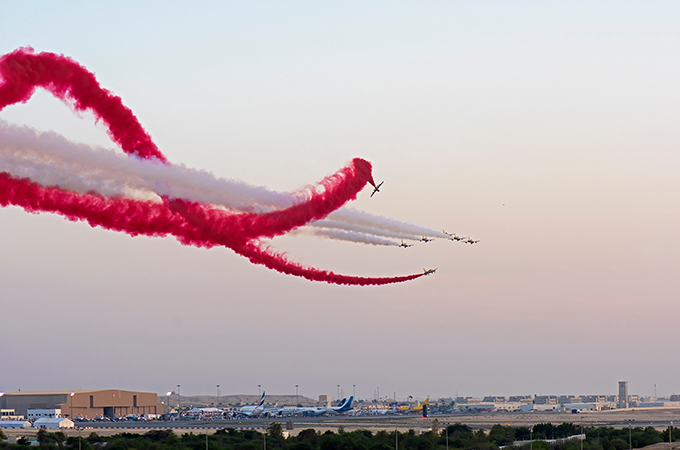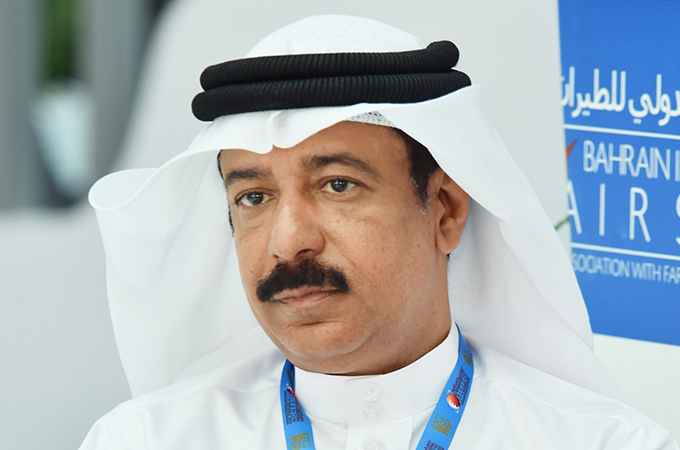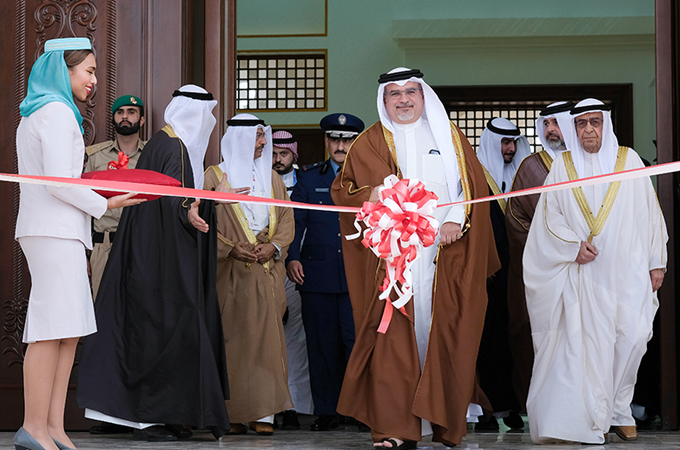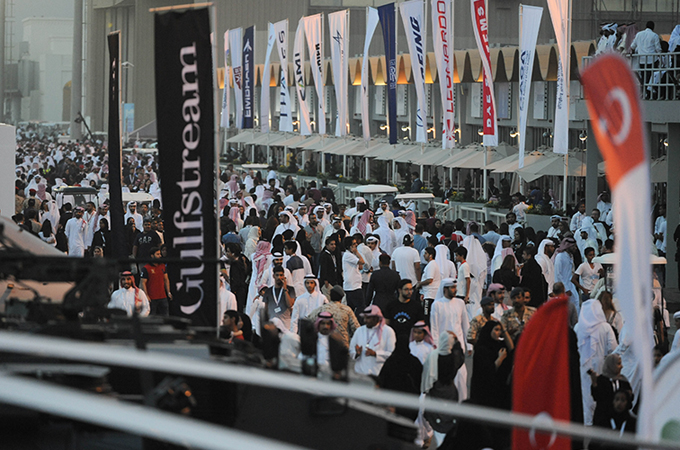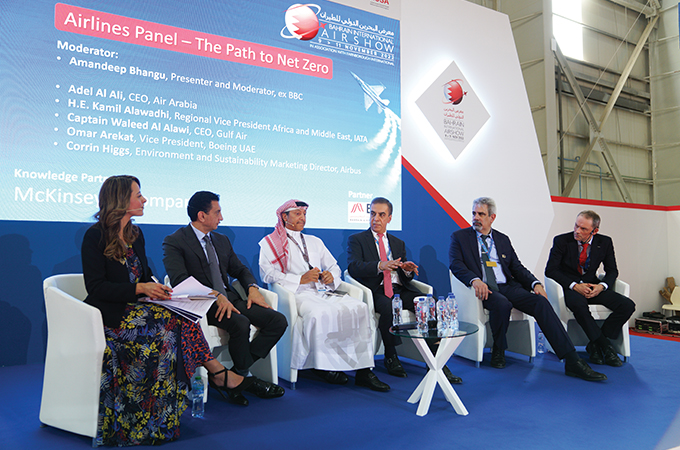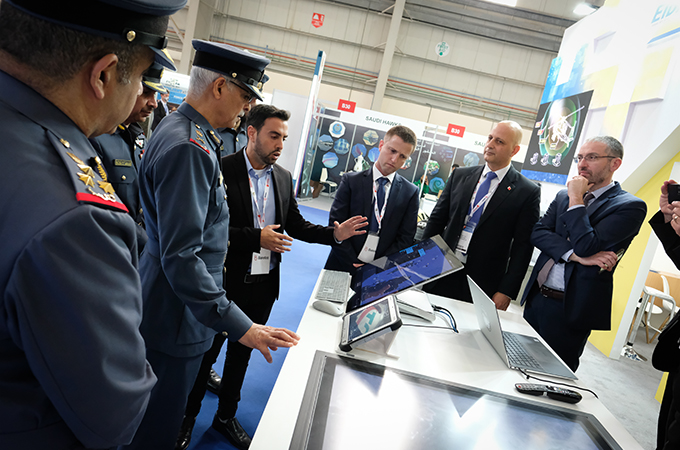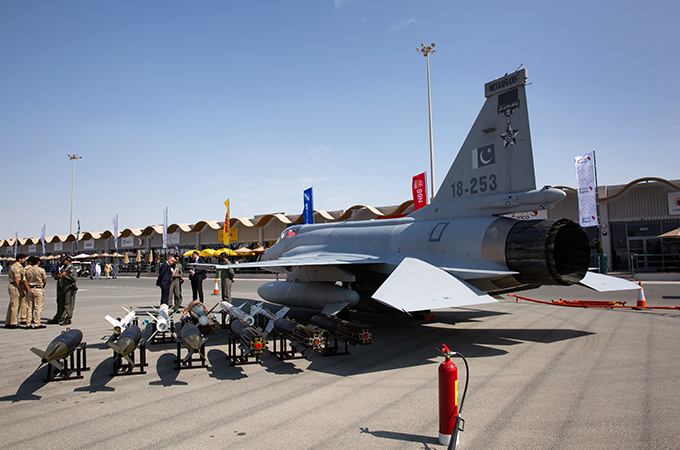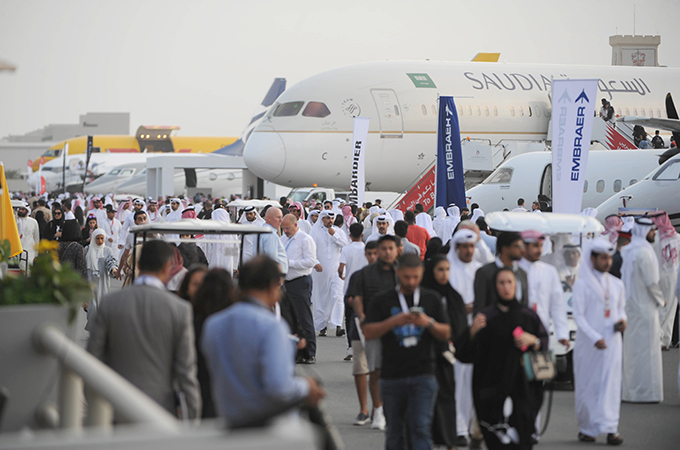Autumn 2024
Bahrain International Airshow (BIAS), set to be hosted in November, distinguishes itself as a “boutique” airshow, offering personalised service and a premium experience for both exhibitors and participants, writes Sree Bhat
Bahrain has long been a strategic hub for the aviation industry, driving regional growth and innovation in the sector. The Bahrain International Airshow (BIAS) has helped solidify the kingdom’s place on the global aviation map.
Returning from November 13-15, 2024, BIAS will showcase cutting-edge aerospace technologies, aircraft, breathtaking displays, and lucrative deal-making opportunities for key players in the industry.
“Our goal is to present a comprehensive view of the aviation ecosystem, highlighting technological advancements and operational innovations. This isn’t just about aircraft; we’re creating an environment that encompasses the full range of services offered to airports, passengers, and airlines,” says Yousif Mahmoud, Director General of BIAS, in an exclusive interview with Arabian Knight.
BIAS distinguishes itself as a “boutique” airshow, offering personalised, five-star service and a premium experience for both exhibitors and participants.
“This year, we are determined to surpass the achievements of the 2022 edition. We’re elevating the event with a world-class delegation programme and unparalleled networking opportunities with high-level decision-makers,” Mahmoud adds.
“What really stands out this year is the rapid pace of technological advancements and the focus on sustainability,” he remarks.
Excerpts from the interview:
As the Bahrain International Airshow continues to grow in prominence, what is the overarching theme or focus of this year’s event?
The 2024 Bahrain International Airshow will primarily spotlight three key sectors: general aviation, light aircraft, and defence. These areas are pivotal to the aircraft business, and we’re dedicating much of our attention to them. In addition, we will also cover related industries such as airport supply chains, spare parts, military technologies, and ground handling services and equipment. Furthermore, the space sector will play a significant role, with an emphasis on technology in the sector.
We aim to offer a holistic view of the aviation ecosystem, from technological advancements to operational innovations. Beyond just showcasing aircraft, we are creating an environment that reflects the entire spectrum of services provided to airports, passengers, and airlines.
One of the most exciting innovations we’re highlighting is the emergence of light aircraft that are affordable and accessible for individual use. These aircraft present an incredible opportunity for flying enthusiasts. Additionally, we’re showcasing vertical take-off and landing (VTOL) technology, which could potentially revolutionise short-distance travel, making personal aviation more convenient and accessible.
What can attendees expect from the Bahrain International Airshow 2024, and how does it stand out from previous editions?
While the core elements of the airshow remain consistent – displaying aircraft, fostering trade, and promoting business – what really stands out this year is the rapid pace of technological advancements. The aviation industry is evolving quickly, with innovations in electric aircraft, carbon-zero fuel consumption, and eco-friendly materials. These advancements are shaping not only the aircraft themselves but also how they are operated, with a clear focus on reducing emissions and protecting the environment.
The show is a platform for what’s coming in the next decade, not just what’s happening today. People can see, feel, and understand the future of aviation through the technology and experiences we present here. It’s all about staying ahead of the curve, discussing innovations that will shape the industry for years to come.
How does the airshow address the challenges of sustainability and environmental impact in aviation?
The environmental impact of aviation is a major concern, and we are taking steps to address it. The use of sustainable materials and technologies, such as electric aircraft and alternative fuels, is one way we are contributing to a greener future. Reducing toxic emissions and fuel consumption is a key focus of the innovations on display. We aim to show how the industry is moving toward more environmentally responsible practices without compromising on safety, efficiency, or passenger experience.
In essence, this year’s airshow not only showcases the latest in aviation technology but also highlights the industry’s commitment to sustainability. This is a vital topic, and the innovations on display are paving the way for a cleaner, more sustainable future in air travel.
In your view, what role does the airshow play in positioning Bahrain as a hub for aviation and aerospace in the region?
Bahrain has long been a strategic hub for the aviation industry. The airshow helps solidify our position on the global stage. At the 2022 show, we’ve seen numerous partnerships and millions in investments announced at the event.
In 2022, we hosted representatives from 59 countries, with over 186 companies participating and 222 civilian and military delegations present. In 2024, we aim to exceed these numbers, enhancing the show with a world-class delegation programme and providing visitors unique networking opportunities with high-level decision-makers. Major industry players like Rolls-Royce, Boeing, Airbus, Lockheed Martin and Leonardo will all be present, positioning Bahrain as a key destination for global aviation events.
How does the airshow contribute to Bahrain’s economy and its relationships with global aviation giants?
The airshow is much more than an exhibition – it’s a critical driver for Bahrain’s economy. The influx of international visitors brings a significant boost to the local economy, from hotels and car rentals to restaurants and airport services. This event not only promotes Bahrain’s trade and investment sectors but also stimulates spending across multiple industries. This has a direct impact on Bahrain’s economy, contributing to our impressive GDP growth.
Moreover, the airshow enhances Bahrain’s diplomatic and economic relationships with countries around the world. We’re hosting around 67 military delegations and 240 civil delegations from various nations. This strengthens our ties with friendly countries and neighbouring states, fostering political and economic cooperation.
The Bahrain International Airshow is a powerful tool for positioning the kingdom as a leading country in the region. It helps establish our soft power through diplomatic and business channels, ensuring we maintain strong relationships with countries across the globe. The event allows us to showcase our capabilities on the world stage, reinforcing Bahrain’s reputation as a modern, dynamic country capable of hosting prestigious international events.
Can you share details of some of the most exciting new aircraft and technologies that will be showcased at this year’s Bahrain International Airshow?
We’re expecting over 150 aircraft on static display this year, ranging from military jets and civilian planes to helicopters and general aviation aircraft. There will be a diverse mix of technologies on show, offering something for everyone in the aviation industry.
Some of the highlights this year will include the Boeing 787 and the Pakistani JF-17 fighter jet, one of the latest military aircraft. We’ll also have the European Typhoon, the Saudi Hawk display team, and – perhaps the most exciting – a Boeing B-52, the largest bomber in the world, which will perform a low pass during the airshow. This is a US Air Force aircraft, and no other country operates it, so it’s a special attraction.
Additionally, we’re expecting the F-35, a fifth-generation fighter jet. While I can’t confirm its attendance just yet, it’s in the pipeline. On top of that, we’ll showcase a revolutionary aircraft that uses electric power, a concept that’s still in development but holds immense potential for short-range travel.
How will different aspects of aviation be highlighted at the airshow?
We’re hosting four major conferences during the airshow, covering various sectors including airlines, airports, defence, and space. These conferences will tackle the latest challenges and opportunities in the industry, such as sustainability, the use of electric aircraft, and how airlines and airports are adapting to new technologies.
In particular, we’ll focus on the ongoing issues of capacity between airlines and airports, environmental impact, and the growing importance of space technology in aviation. The defence conference will look at the latest trends in military technology, including the rise of drones, which have become more precise and effective than traditional weapons.
Will there be a focus on diversity and inclusion at this year’s event?
Yes, we’re putting a spotlight on the role of women in aviation, as well as gender equality within the industry. Aviation is evolving, and we’re seeing more and more women entering roles that were traditionally male-dominated. Addressing these challenges and promoting inclusion is a priority for us.
Is there a focus on business aviation at BIAS, particularly on private jets?
Yes, business aviation, including private jets, is an important part of the show. Private jets are often used by royal families, government officials, and business elites, and we cater to their specific needs. Several private jets will be on display at the event, reflecting the growing interest in business aviation in the region.
How has international interest in the Bahrain International Airshow evolved over the years?
Hosting an airshow is a major achievement for any country, and Bahrain has managed to continue with it for over 14 years. Many countries have tried to hold airshows but couldn’t sustain them. We’re now preparing for the seventh edition, which speaks to the stability and growth of the event.
While we’re limited in the number of chalets we can offer, we’ve focused on growing the quality of exhibitors, delegations, and the technology on display. Over the years, we’ve added exhibition halls and conferences, enhancing the overall experience. The Manama Air Power Symposium, which takes place the day before the airshow, is a key part of this. It attracts chiefs of air staff from around the world and has grown alongside the airshow itself.
What new partnerships and collaborations have emerged from the event? Have there been any significant partnerships formed as a result of the show?
We’ve been working closely with many countries, including Saudi Arabia, the UAE, the UK, and the US, to bring trade missions and have a strong presence at the show. This collaboration supports long-term business relationships and creates opportunities, especially for small and medium-sized enterprises (SMEs).
Since the first edition in 2010, we’ve seen some major companies open offices in Bahrain because of the airshow. Companies like BAE Systems, Thales, Leonardo, DFS Aviation, and Indra have set up shop here. These partnerships have been key to our success, contributing significantly to Bahrain’s economic growth through the airshow.
How does Farnborough International help in organising BIAS, and how has that partnership benefitted the show?
Farnborough International has over 75 years of experience hosting its own airshow in the UK, and its partnership with us has been invaluable. Its involvement provides international companies with the confidence that Bahrain’s airshow is managed with the highest levels of safety, security, and professionalism. Farnborough helps us stage the event and ensures that we meet international standards, which encourages top global players to participate in the show.
The aviation sector is growing rapidly in the Middle East. What role does Bahrain play in this growth, and how do you see the region evolving?
The aviation sector in the Middle East, particularly in the GCC, is witnessing rapid growth. Saudi Arabia, for instance, has placed orders for over 900 aircraft as they develop new airlines. In the UAE, Emirates and Etihad are expanding, with over 600 aircraft in operation. Qatar Airways is also growing fast, with a fleet of over 250 aircraft. While Gulf Air may have a smaller fleet in comparison, it is performing well within this competitive environment.
The region is leading aviation growth, and Bahrain plays a significant role, particularly in terms of offering a more boutique airshow experience that focuses on quality over quantity. This steady growth in aviation is crucial for the regional economy and will continue to bolster Bahrain’s role in this thriving sector.
With many airshows in the region, how does BIAS differentiate itself from the competition?
Each airshow in the region has its own unique selling points. Bahrain International Airshow is distinct because of the high-end services we provide. For instance, we offer a “turnkey package” to companies that purchase a chalet, which includes all logistical and hospitality arrangements. Moreover, we focus on exclusivity and privacy. The meetings that take place at BIAS are private, and companies have the luxury of spending an entire day with their guests, ensuring ample time to discuss business and close deals. It’s not just about quick, ten-minute meetings; it’s about building long-term relationships. We also pride ourselves on our hospitality, with chauffeur services for every company that participates, offering a unique and personal touch.
We refer to BIAS as a “boutique” airshow because of these personalised, five-star services and the overall experience we provide, making it truly stand out from other shows.
We are not competing with other airshows; we are complementing them. Each airshow has its own characteristics. Ultimately, it’s about fostering the aviation industry in the Middle East and creating opportunities for growth.



